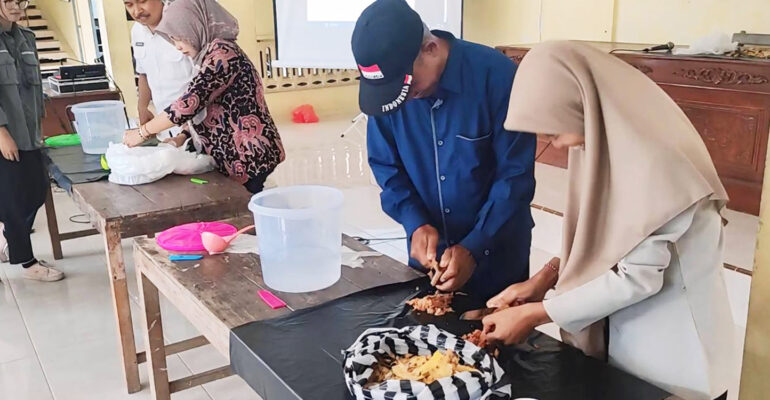IPB University MBKM Internship Students Provide Ecoenzyme Training to Mlinjon Village Community

Freedom of Learning – Independence Campus (MBKM) Internship Students of the Silviculture Department, Faculty of Forestry and Environment (Fahutan) IPB University collaborated with the Trenggalek Regency Government (Pemkab) to provide training on processing organic waste into ecoenzymes to the community in Mlinjon Village.
This activity is a Kedaireka matching fund program in 2024 in an effort to support environmentally friendly organic waste management. The training was held in Mlinjon Village, Trenggalek Regency, East Java and was attended by residents who were enthusiastic to learn about the benefits of ecoenzymes and how to make them.
Ecoenzyme is an environmentally friendly solution to reduce waste and improve the quality of the surrounding environment. In the one-day training, participants were introduced to the concept of ecoenzymes and their positive impact on the environment.
Participants were also taught simple fermentation techniques to convert kitchen waste into ecoenzyme products that can be used daily. The participants were invited to directly try mixing ingredients such as fruit peels, sugar, and water according to the predetermined measurements.
This activity aims to raise public awareness of the importance of household waste management. “By making ecoenzymes, we not only reduce waste, but also create natural products that can be utilized in various daily needs,” said a speaker from the Silviculture Department team.
Mlinjon villagers welcomed the training. They said they were interested in applying the ecoenzyme-making technique in their homes. “This is a very useful new experience. We now know how to process fruit and vegetable scraps that are usually wasted,” said Mariyamah, one of the training participants.
In the future, it is hoped that more villagers will adopt ecoenzyme as a joint effort to keep the environment clean. The Silviculture Department also plans to provide further training and supporting facilities so that villagers can make ecoenzymes sustainably.
With this ecoenzyme training, Mlinjon Village is expected to become an example of a village that actively manages waste sustainably. Ecoenzymes not only reduce the volume of organic waste, but also contribute to a healthier quality of living environment. This initiative is part of the Silviculture Department’s move to support environmental conservation at the village level.
Through training and development efforts like this, Mlinjon Village and the Silviculture Department hope to realize a cleaner, healthier, and more sustainable environment for future generations. (*/Rz) (IAAS/SNI)



